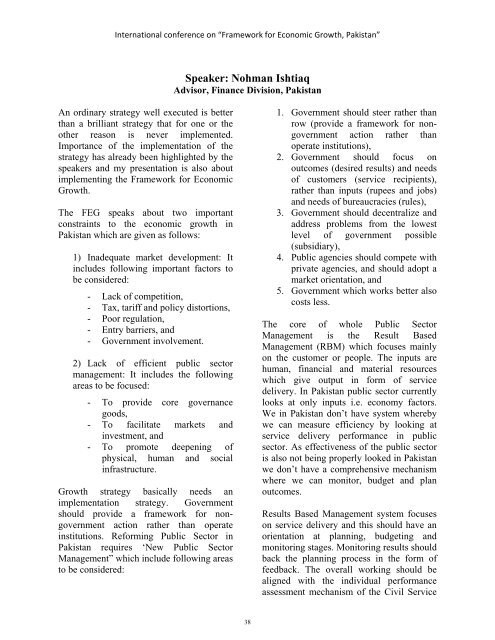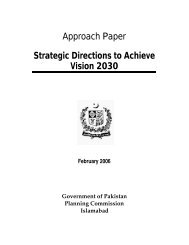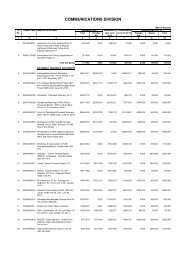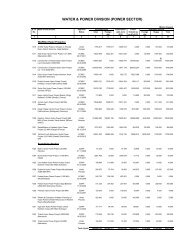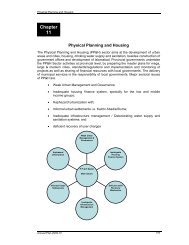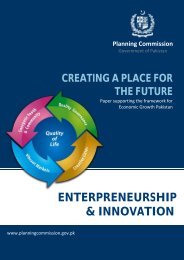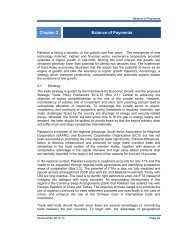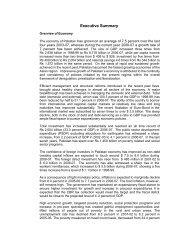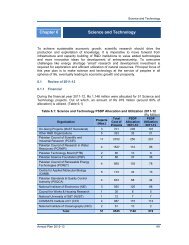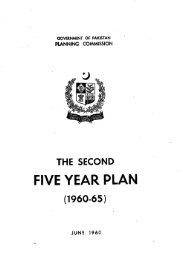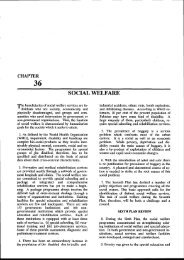Framework for Economic Growth, Pakistan - Planning Commission
Framework for Economic Growth, Pakistan - Planning Commission
Framework for Economic Growth, Pakistan - Planning Commission
Create successful ePaper yourself
Turn your PDF publications into a flip-book with our unique Google optimized e-Paper software.
International conference on “<strong>Framework</strong> <strong>for</strong> <strong>Economic</strong> <strong>Growth</strong>, <strong>Pakistan</strong>”Speaker: Nohman IshtiaqAdvisor, Finance Division, <strong>Pakistan</strong>An ordinary strategy well executed is betterthan a brilliant strategy that <strong>for</strong> one or theother reason is never implemented.Importance of the implementation of thestrategy has already been highlighted by thespeakers and my presentation is also aboutimplementing the <strong>Framework</strong> <strong>for</strong> <strong>Economic</strong><strong>Growth</strong>.The FEG speaks about two importantconstraints to the economic growth in<strong>Pakistan</strong> which are given as follows:1) Inadequate market development: Itincludes following important factors tobe considered:- Lack of competition,- Tax, tariff and policy distortions,- Poor regulation,- Entry barriers, and- Government involvement.2) Lack of efficient public sectormanagement: It includes the followingareas to be focused:- To provide core governancegoods,- To facilitate markets andinvestment, and- To promote deepening ofphysical, human and socialinfrastructure.<strong>Growth</strong> strategy basically needs animplementation strategy. Governmentshould provide a framework <strong>for</strong> nongovernmentaction rather than operateinstitutions. Re<strong>for</strong>ming Public Sector in<strong>Pakistan</strong> requires ‘New Public SectorManagement” which include following areasto be considered:1. Government should steer rather thanrow (provide a framework <strong>for</strong> nongovernmentaction rather thanoperate institutions),2. Government should focus onoutcomes (desired results) and needsof customers (service recipients),rather than inputs (rupees and jobs)and needs of bureaucracies (rules),3. Government should decentralize andaddress problems from the lowestlevel of government possible(subsidiary),4. Public agencies should compete withprivate agencies, and should adopt amarket orientation, and5. Government which works better alsocosts less.The core of whole Public SectorManagement is the Result BasedManagement (RBM) which focuses mainlyon the customer or people. The inputs arehuman, financial and material resourceswhich give output in <strong>for</strong>m of servicedelivery. In <strong>Pakistan</strong> public sector currentlylooks at only inputs i.e. economy factors.We in <strong>Pakistan</strong> don’t have system wherebywe can measure efficiency by looking atservice delivery per<strong>for</strong>mance in publicsector. As effectiveness of the public sectoris also not being properly looked in <strong>Pakistan</strong>we don’t have a comprehensive mechanismwhere we can monitor, budget and planoutcomes.Results Based Management system focuseson service delivery and this should have anorientation at planning, budgeting andmonitoring stages. Monitoring results shouldback the planning process in the <strong>for</strong>m offeedback. The overall working should bealigned with the individual per<strong>for</strong>manceassessment mechanism of the Civil Service38


